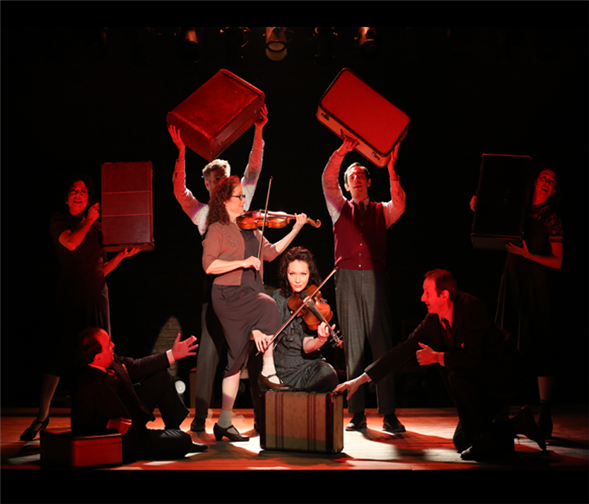Translate Page

How Paula Vogel ignites her latest play
---
The characters in Indecent are based on real people – people who were vibrantly, aggressively alive. Paula Vogel won't let us forget that. She won't let us experience her play as a sweet little lecture, with a hundred vintage photos and a dead man's pulse.
Working with Rebecca Taichman – the play's director and co-creator – she has instead built a show that quivers and writhes. Understanding how she's done it not only illuminates her process, but also clarifies why the history of Indecent will always be relevant.
About that history: The production, which is now at the Vineyard Theatre, tracks Sholom Asch's play God of Vengeance. Written in 1907, it became a cornerstone of Yiddish-language theatre around the world, depicting everything from intimate lesbian love to the hypocrisy of religious zealots. Its legacy might have remained spotless, but when an English-language production came to Broadway in 1923 – even with the tender lesbian love scene removed – New York authorities indicted the cast for performing immoral work.
Indecent confronts the aftermath of those indictments. It depicts the consequences for the actors – mostly immigrants – and ponders why so many refused to give up on the play. It considers why Asch himself failed to appear at the court proceedings, and it notes, sorrowfully, how this event collided with the rise of Nazism in Europe.
And again, it does this without becoming dry history.
That's partly because the play is filled with music and dance. Three live musicians are always on stage, and the characters constantly burst into Yiddish folk songs like "Ale Brider" or period hits like "Bei Mir Bist Du Schön".
"Here's what music does for me," Vogel says. "It's like looking at a photograph in sepia, and all of a sudden it's no longer a sepia photograph. It's actually living. It's actually color. It's actually flesh and blood. How do you scrape off the 'historic' from history and actually get to the same time and place? For me, that's what music does."
When we hear these songs, then, we get closer to the world these characters lived in. But what about their minds? Their hearts? Vogel wants to lay those bare as well.
That's why there are supertitles. Projected captions not only tell us which year it is or where we are, but also reveal what characters are thinking. When we see them standing at Ellis island, for instance, the caption reads, "An impossibly long line." And something about that word – "impossibly" – takes us deeper into their experience. Something about that caption clarifies who they are.
This is especially true in the final scenes, when captions reveal that certain things on stage can only be seen by a single character. That information adds emotion to the scene like a haymaker to the chin.
Vogel's no stranger to this type of device. Her plays often feature characters talking to the audience or bits of text appearing on the walls. "I've always been interested in a kind of mixed-genre narrative," she says. "That comes from the frustration of, 'How can you get inside a person's head on stage?'"
Discussing the last scene of Indecent, she adds, "The titles take us into [the character's] mind. We're able to see what only he can see, and it creates an intimacy. It creates an inclusion. I wanted the titles to make us feel included and to allow us that intimacy with him. What I'm hoping is that by the end of the play, we completely understand."
---
TDF Members: At press time, discount tickets were available for Indecent. Go here to browse our current offers.
Follow Mark Blankenship at @IAmBlankenship. Follow TDF at @TDFNYC.
Photos by Carol Rosegg. Top photo: The cast of 'Indecent.'